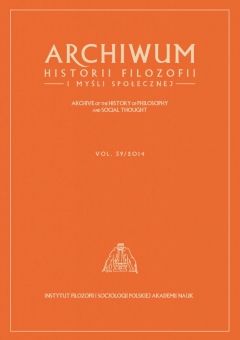Myślenie pojęciowe w Heglowskiej Nauce logiki
Conceptual Thinking in Hegel’s Science of Logic
Author(s): Pirmin Stekeler-WeithoferSubject(s): Logic, Ontology
Published by: Instytut Filozofii i Socjologii Polskiej Akademii Nauk
Keywords: Hegel; a priori; appearance; being; concept; essence; for itself; form; generic inference; in itself; logic; ontological proof; projection;
Summary/Abstract: Hegel’s logic is an analysis of being in the sense of all possible objects of thought and experience, of essence in the sense of all meaningful theoretical explanations of appearances or phenomena, and of the concept in the sense of our conceptual system of default differentiations and generic inferences. he contrast between general sentences expressing situation- and time-independent dispositions as default inferences and empirical truths with a situational and temporal dependent copula (was/is/will be) replaces Kant’s distinction between a priori and a posteriori judgments in the Critique of Pure Reason. Truth, reality and objectivity are not situated in a transcendent sphere behind the phenomena, but play an internal role in our trans-subjective explication and explanation of experience in the generic sense of what can be inter-subjectively recognized or reproduced.
Journal: Archiwum Historii Filozofii i Myśli Społecznej
- Issue Year: 59/2014
- Issue No: 59
- Page Range: 115-150
- Page Count: 36
- Language: English

